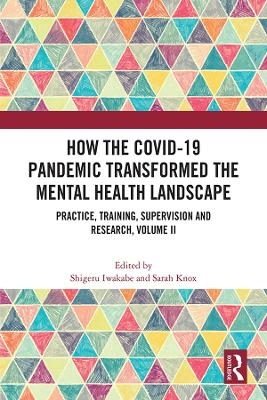
How the COVID-19 Pandemic Transformed the Mental Health Landscape
Routledge (Verlag)
978-1-032-39980-5 (ISBN)
- Lieferbar (Termin unbekannt)
- Versandkostenfrei innerhalb Deutschlands
- Auch auf Rechnung
- Verfügbarkeit in der Filiale vor Ort prüfen
- Artikel merken
This book is a valuable historical record of how counselling psychologists responded to the COVID-19 pandemic around the globe. Volume II presents 17 chapters that address four major topic areas. In the first, the chapters focus on training and supervision: during the pandemic, most on-site training and supervision had to be discontinued to prevent spread of the virus. However, many trainers and training programs found creative ways to continue to provide training opportunities to their trainees. The second focus is on the populations who may require specialty care during times of such upheaval, such as those with psychosis and serious mental illness. In the third part, the chapters speak to the pandemic across cultures, as well as its effects on clients from underrepresented groups. Finally, three chapters present research perspectives on the pandemic.
Written by prominent researchers and clinicians in the field of counselling and psychotherapy, both the volumes together cover a wide range of perspectives and offer useful clinical recommendations related to effective telepsychotherapy practice. The chapters in these volumes were originally published as a special issue of Counselling Psychology Quarterly.
Shigeru Iwakabe is Professor of Clinical Psychology at Ritsumeikan University in Osaka, Japan. He conducts psychotherapy research on client emotional processes from an integrative perspective. His research interests include training and professional development in psychotherapy, case study research methods, psychotherapy integration, and cultural and social issues related to the practice of psychotherapy. Sarah Knox is Professor in the Department of Counselor Education and Counseling Psychology at Marquette University, Milwaukee, WI, USA. The vast majority of her research is qualitative, and specifically uses consensual qualitative research (CQR). She focuses primarily on the psychotherapy relationship and process, training and supervision, and advising relationships and processes.
Preface Part I: Responding to the Pandemic across Cultures 1. Adapting mental health services to the COVID-19 pandemic: reflections from professionals in four countries 2. Even more to handle: additional sources of stress and trauma for clients from marginalized racial and ethnic groups in the United States during the COVID-19 pandemic 3. Telephone-based psychological crisis intervention: the Portuguese experience with COVID-19 4. Connectedness under social distancing - a support group practice report Part II: Specific Populations 5. Teletherapy with serious mental illness populations during COVID-19: telehealth conversion and engagement 6. The impact of COVID-19 on coordinated specialty care (CSC) for people with first episode psychosis (FEP): Preliminary observations, and recommendations, from the United States, Israel and China 7. Special challenges in psychotherapy continuation and adaption for persons with schizophrenia in the age of coronavirus (COVID-19) 8. Transitioning a technology- assisted stepped- care model for traumatic injury patients to a fully remote model in the age of COVID-19 9. Clinical management of common presentations of patients diagnosed with BPD during the COVID-19 pandemic: the contribution of the MBT framework Part III: Training and Supervision 10. Telepsychology training in a public health crisis: a case example 11. “The remainder of your practicum training has been terminated”: a unique challenge faced by trainees during the COVID-19 pandemic 12. Shifting a training clinic to teletherapy during the COVID-19 pandemic: a trainee perspective 13. Supervision from Afar: trainees’ perspectives on telesupervision 14. Tending the grapevine: a qualitative analysis of responses to a psychotherapist-in-training testing positive for COVID-19 Part IV: Research Perspectives 15. Supporting practice based evidence in the COVID- 19 crisis: three researcher- practitioners’ stories 16. Hope during the COVID- 19 outbreak: coping with the psychological impact of quarantine 17. Responding to the Covid- 19 pandemic at a university counselling center: administrative actions, client retention, and psychotherapy outcome
| Erscheinungsdatum | 16.10.2024 |
|---|---|
| Verlagsort | London |
| Sprache | englisch |
| Maße | 174 x 246 mm |
| Themenwelt | Medizin / Pharmazie ► Medizinische Fachgebiete ► Psychiatrie / Psychotherapie |
| Studium ► Querschnittsbereiche ► Infektiologie / Immunologie | |
| Sozialwissenschaften ► Soziologie | |
| ISBN-10 | 1-032-39980-5 / 1032399805 |
| ISBN-13 | 978-1-032-39980-5 / 9781032399805 |
| Zustand | Neuware |
| Informationen gemäß Produktsicherheitsverordnung (GPSR) | |
| Haben Sie eine Frage zum Produkt? |
aus dem Bereich


